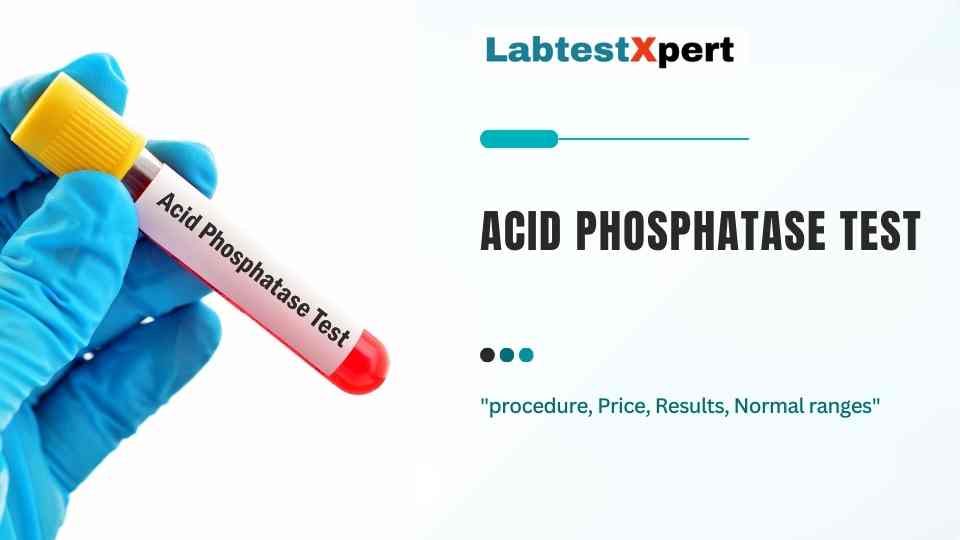The acid phosphatase test, also known as the prostatic acid phosphatase (PAP) test, is a diagnostic laboratory test used to measure the levels of acid phosphatase in a patient’s blood serum or other body fluids. Acid phosphatase is an enzyme found in various tissues of the body, with the highest levels typically present in the prostate gland, liver, and red blood cells.
In a medical context, the acid phosphatase test is primarily associated with the assessment of prostate health. Elevated levels of acid phosphatase in the bloodstream can be indicative of prostate-related issues, such as prostate cancer, prostatitis (inflammation of the prostate), or other conditions affecting the prostate gland. However, it’s important to note that while the acid phosphatase test can be suggestive of prostate problems, it is not specific to prostate cancer, and further diagnostic tests, such as a prostate-specific antigen (PSA) test or a biopsy, are usually required to confirm a diagnosis.
The acid phosphatase test has become less common in recent years, with the PSA test being more widely used as a marker for prostate health. Nevertheless, the acid phosphatase test may still be employed in specific clinical situations, especially when monitoring the response to treatment in patients with advanced prostate cancer.
Alternate name of the acid phosphatase test?
The acid phosphatase test is also commonly referred to as the “Prostatic Acid Phosphatase (PAP) Test.” This alternate name specifically emphasizes the association of the test with the prostate gland, as prostatic acid phosphatase is produced by the prostate and is one of its important markers.
Specimen requirements and preparation
The specimen requirements and preparation for the acid phosphatase test may vary depending on the specific laboratory or healthcare facility conducting the test. However, here are some general guidelines:
Type of Tube:
The acid phosphatase test typically requires a blood sample, and the sample is collected in a lavender-top (EDTA) tube. Lavender-top tubes are often used for testing blood samples, as EDTA (ethylenediaminetetraacetic acid) is an anticoagulant that helps preserve the integrity of the blood sample.
Sample Volume:
The sample volume required for the acid phosphatase test is usually a small amount of blood, typically around 3-5 milliliters (mL) of whole blood. The laboratory will specify the exact volume required.
Fasting Sample:
Fasting is not typically required for the acid phosphatase test. It can be performed on a non-fasting sample.
Preparation for Test:
In most cases, no specific preparation is needed for the acid phosphatase test. However, it’s essential to follow any instructions provided by your healthcare provider or the laboratory where the test is being performed. Inform your healthcare provider of any medications you may be taking, as some drugs can affect test results.
Acid phosphatase function in our body
Acid phosphatase is an enzyme that plays various roles in the human body, and it is found in different tissues and cell types. Its functions are not limited to one specific location but can vary depending on the context. Here are some of the general functions of acid phosphatase in the body:
- Prostate Function:
Acid phosphatase is most notably associated with the prostate gland. It is produced by the prostate and secreted into the seminal fluid, where it plays a role in liquefying the semen and allowing sperm mobility. Therefore, acid phosphatase levels can be used as a marker for prostate health, and abnormal levels may indicate prostate issues, such as prostate cancer.
- Bone Metabolism:
Acid phosphatase is also found in osteoclasts, which are cells involved in bone remodelling. In this context, acid phosphatase is important for the breakdown of bone tissue during bone resorption. Elevated levels of acid phosphatase in the blood can be indicative of increased bone turnover and may be seen in conditions like Paget’s disease or bone metastases.
- Lysosomal Function:
Acid phosphatase is present in lysosomes, cellular organelles responsible for breaking down waste materials and cellular debris. It aids in the hydrolysis of various substrates, including proteins and nucleic acids, as part of cellular recycling and waste disposal.
- Red Blood Cell Function:
Acid phosphatase is found in red blood cells (erythrocytes) and is involved in their metabolism. It plays a role in maintaining the structure and function of these blood cells.
Acid phosphatase test Normal ranges
The normal ranges for the acid phosphatase test, also known as prostatic acid phosphatase (PAP) test, can vary slightly between different laboratories and may be reported in different units of measurement. Additionally, the reference ranges may also differ based on the age and sex of the individual. Here are approximate reference ranges for the acid phosphatase test:
Adult Males:
Normal range: 0.13 to 0.63 units/L
Adult Females:
Normal range: 0.13 to 0.63 units/L
Children:
Normal range: 8.6 to 12.0 units/mL
These ranges can vary depending on the Units , child’s age, and the specific reference values provided by the laboratory.
Newborns:
Normal range: 10.4 to 16.4 units /mL
Newborn reference ranges for acid phosphatase may be different from those for children and adults. These reference values can also vary depending on the specific laboratory.
Acid phosphatase test Price:
- In government-run hospitals: ₹ 100 to ₹300 or even less.
- In private diagnostic centres: ₹ 200 to ₹1,000 or more.
To get the most accurate and up-to-date pricing for the acid phosphatase test in your specific location in India, I recommend contacting local diagnostic centres, hospitals, or healthcare providers. They can provide you with precise pricing information based on your location and the type of facility you choose for the test.
Acid phosphatase test Symptoms:
A blood test can be a valuable diagnostic tool for a wide range of medical conditions, and it can help identify or monitor various health issues. If you are experiencing symptoms that are concerning or persistent, your healthcare provider may recommend a blood test. Some common symptoms and conditions that may prompt the need for a blood test include:
Acid phosphatase test – Symptoms of high levels:
Symptoms of elevated levels depend on which specific substance is elevated and the underlying cause. Here are some examples of symptoms associated with high levels of certain substances:
- High Blood Sugar (Hyperglycemia):
- High Cholesterol (Hypercholesterolemia):
- High Blood Pressure (Hypertension):
- High Uric Acid (Hyperuricemia):
- High Triglycerides (Hypertriglyceridemia):
- High Liver Enzymes:
- High Creatinine:
- High Bilirubin:
- High Potassium (Hyperkalemia):
- High Calcium (Hypercalcemia):
Acid phosphatase test Symptoms of Low levels:
Symptoms of low levels depend on which specific substance is deficient and the underlying cause. Here are some examples of symptoms associated with low levels of certain substances:
- Low Blood Sugar (Hypoglycemia):
- Low Red Blood Cells (Anemia):
- Low White Blood Cells (Leukopenia):
- Low Platelets (Thrombocytopenia):
- Low Iron Levels (Iron Deficiency):
- Low Vitamin D Levels (Vitamin D Deficiency):
- Low Vitamin B12 Levels (Vitamin B12 Deficiency):
- Low Thyroid Hormone Levels (Hypothyroidism):
- Low Sodium (Hyponatremia):
- Low Potassium (Hypokalemia):
If you suspect you have low levels or High Levels of a specific substance or are experiencing concerning symptoms, it’s essential to consult with a healthcare provider for a proper evaluation, diagnosis, and treatment. Additionally, the interpretation of blood test results should be done by a medical professional who can consider your overall health and medical history.
Why do healthcare providers order “Acid phosphatase test”?
Healthcare providers may order the acid phosphatase test for several reasons, primarily related to evaluating prostate health and monitoring certain medical conditions. Here are some common reasons why healthcare providers may order an acid phosphatase test:
- Prostate Cancer Screening:
The acid phosphatase test was historically used as a marker for prostate health and to assess the risk of prostate cancer. High levels of acid phosphatase in the bloodstream may suggest the presence of prostate cancer. While it is less commonly used today compared to the prostate-specific antigen (PSA) test, it may still be considered in some cases, especially when other tests are inconclusive or to monitor prostate cancer treatment.
- Prostate Health Assessment:
It may be ordered as part of routine check-ups or as a complementary test to the PSA test to assess prostate health. Changes in acid phosphatase levels may suggest prostate problems, such as prostatitis or benign prostatic hyperplasia (BPH).
- Monitoring Prostate Cancer Treatment:
For individuals with a history of prostate cancer, the acid phosphatase test may be used to monitor the effectiveness of treatment or to detect recurrence of the cancer.
- Evaluating Bone Disorders:
In addition to its role in prostate health, acid phosphatase is found in osteoclasts, cells involved in bone resorption. Elevated acid phosphatase levels can be indicative of certain bone disorders, such as Paget’s disease, or bone metastases from cancer.
- Assessing Bone Metabolism:
It may be ordered to evaluate bone health and metabolism, particularly in cases where bone turnover is a concern.
- Diagnosing Other Conditions:
In rare cases, elevated acid phosphatase levels may be associated with other medical conditions, such as Gaucher’s disease, Niemann-Pick disease, or Hairy Cell Leukemia. The test may be used to assist in the diagnosis of these conditions.
Low Acid phosphatase Result mean:
Low results for the acid phosphatase test, which measures the levels of acid phosphatase in the blood, can have various implications depending on the specific context and the underlying cause of the low levels. Here are some potential reasons for low results and their implications:
- Reduced Enzyme Production:
Low acid phosphatase levels may indicate reduced production of the enzyme in tissues where it is normally found. This could be due to factors such as damage to the tissues or a decrease in the number of cells producing acid phosphatase. The specific tissues affected will determine the clinical implications.
- Prostate Health:
In the context of prostate health, low acid phosphatase levels may be expected in healthy individuals. However, when assessing prostate health, elevated levels are of greater concern, as they may suggest prostate issues, such as prostate cancer.
- Bone Health:
Low acid phosphatase levels may be associated with certain bone disorders or conditions affecting osteoclasts, the cells involved in bone resorption. Conditions like hypophosphatasia, a genetic disorder, may result in low acid phosphatase levels.
- Lysosomal Storage Disorders:
Some rare lysosomal storage disorders, such as Niemann-Pick disease and Gaucher’s disease, can lead to low levels of acid phosphatase due to enzyme deficiencies.
- Medications or Treatments:
Certain medications, such as bisphosphonates used to treat osteoporosis, may affect acid phosphatase levels. Low levels may be seen in individuals taking these drugs.
- Lab Error or Sample Issues:
Occasionally, low results can be due to laboratory errors, issues with the sample, or pre-analytical factors. In such cases, a repeat test may be necessary to confirm the result.
High Acid phosphatase Result mean:
High results for the acid phosphatase test, which measures the levels of acid phosphatase in the blood, can have several implications depending on the context and underlying cause of the high levels. Here are some potential reasons for high results and their implications:
- Prostate Health:
In the context of prostate health, elevated acid phosphatase levels can be concerning. High levels may suggest prostate problems, including prostate cancer. It is important to note that the acid phosphatase test was historically used for prostate cancer screening, and a rise in acid phosphatase levels may prompt further evaluation, such as a prostate biopsy or other diagnostic tests.
- Prostatitis:
In addition to prostate cancer, prostatitis, which is the inflammation of the prostate gland, can also lead to increased acid phosphatase levels. Elevated acid phosphatase levels in this context are usually temporary and may return to normal with successful treatment of the prostatitis.
- Bone Disorders:
High acid phosphatase levels can be associated with bone disorders, such as Paget’s disease or bone metastases from cancer. Acid phosphatase is also found in osteoclasts, cells involved in bone resorption, and elevated levels may indicate increased bone turnover.
- Rare Conditions:
In some rare genetic conditions and lysosomal storage disorders, such as Gaucher’s disease and Niemann-Pick disease, high acid phosphatase levels can be observed due to enzyme deficiencies.
- Hairy Cell Leukemia:
Hairy cell leukemia is a rare form of leukemia that can lead to elevated acid phosphatase levels. This test can aid in the diagnosis of this condition.
- Medications:
Some medications, such as drugs used for prostate cancer treatment, may cause transient increases in acid phosphatase levels.
Acid phosphatase Critical results mean
Critical results in the context of the acid phosphatase test, which measures the levels of acid phosphatase in the blood, typically indicate extremely high levels that may require immediate attention and medical intervention. Critical results can be a cause for concern and may signal a serious medical condition. The specific implications of critical acid phosphatase test results can include:
- Prostate Cancer:
When it comes to prostate health, markedly high levels of acid phosphatase in critical test results can raise concerns about advanced prostate cancer, particularly when supported by other clinical signs and diagnostic tests.
- Advanced Bone Metastases:
Extremely high acid phosphatase levels may suggest extensive bone metastases, particularly when associated with a history of cancer, such as advanced prostate cancer or another malignancy.
- Severe Bone Disorders:
In some cases, critical results may be related to severe bone disorders, such as advanced Paget’s disease, characterized by abnormal bone resorption and remodeling.
- Severe Hemolysis or Laboratory Error:
In rare instances, critical results could be due to significant hemolysis (breakdown of red blood cells) during sample collection or processing, or a laboratory error. A repeat test may be necessary to confirm the result.
Benefits of this test “Acid Phosphatase”
The acid phosphatase test, also known as the prostatic acid phosphatase (PAP) test, offers several benefits when used in appropriate clinical contexts:
- Prostate Health Assessment:
- Prostate Cancer Detection:
- Prostate Cancer Treatment Monitoring:
- Bone Health Assessment:
- Supporting the Diagnosis of Rare Conditions:
- Complementary Test:
Reliable sources for researching acid phosphatase test
Researching the acid phosphatase test or related medical topics, it’s important to rely on credible and authoritative sources to ensure the information you gather is accurate and up-to-date. Here’s a list of reliable sources for researching the acid phosphatase test:
- National Institutes of Health (NIH): The NIH provides comprehensive information on medical tests and health topics through its National Library of Medicine. MedlinePlus is a valuable resource: MedlinePlus.
- Centers for Disease Control and Prevention (CDC): The CDC offers information on a wide range of medical tests, public health, and disease prevention: CDC Laboratory Testing.
- Lab Tests Online: Lab Tests Online is a resource developed by the American Association for Clinical Chemistry (AACC) and other laboratory organizations. It provides in-depth information on various laboratory tests, including the acid phosphatase test: Lab Tests Online.
- Mayo Clinic: The Mayo Clinic’s website offers comprehensive information on medical tests and diagnostic procedures, including the acid phosphatase test: Mayo Clinic.
- Cleveland Clinic: The Cleveland Clinic provides patient-friendly information on a wide range of medical topics, including diagnostic tests: Cleveland Clinic Health Library.
- American Urological Association (AUA): The AUA offers resources related to urology, including information on the acid phosphatase test and its use in prostate health and cancer: AUA Patient Information.
- Prostate Cancer Foundation: This foundation provides information about prostate health and cancer, including the use of diagnostic tests like the acid phosphatase test: Prostate Cancer Foundation.
- American Cancer Society: The American Cancer Society offers information on cancer-related tests and screenings, including those related to prostate cancer: American Cancer Society.








